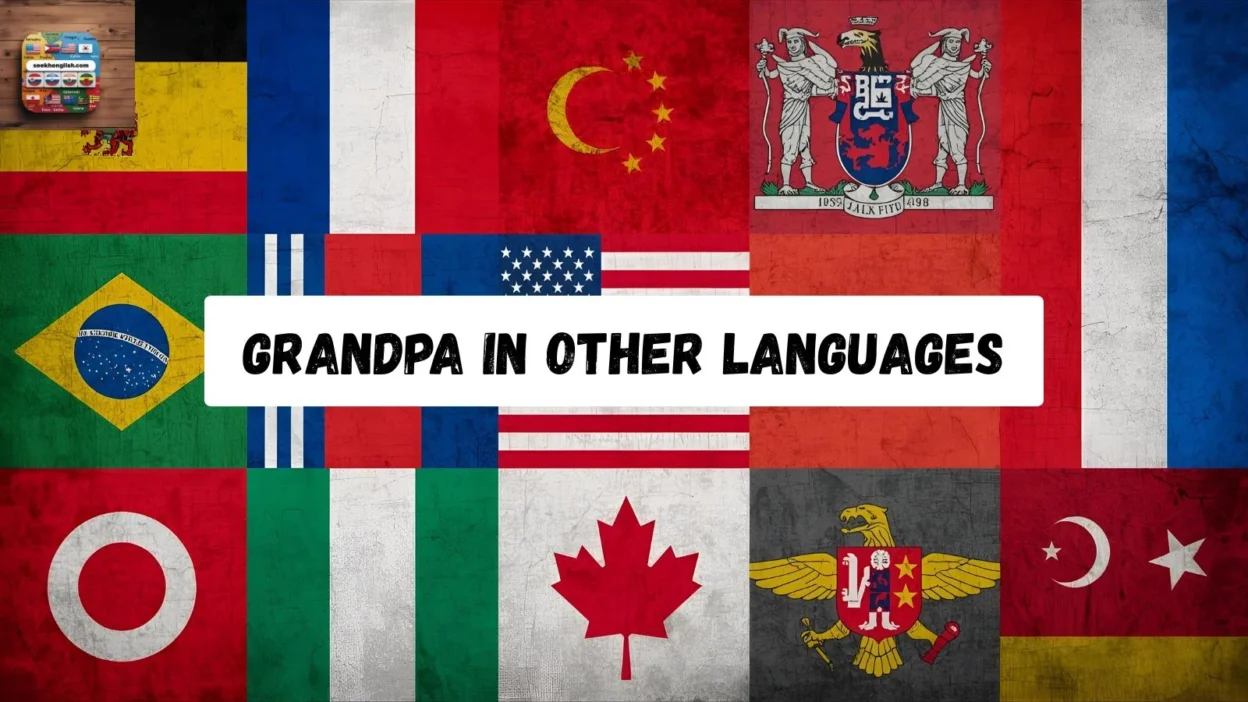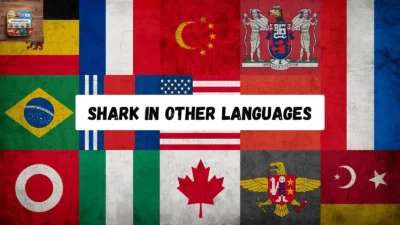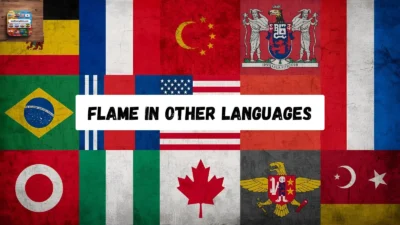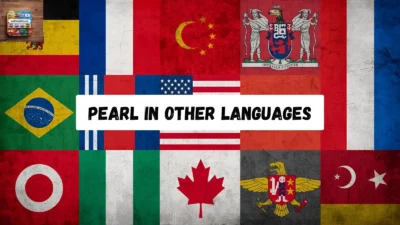People around the world use different words to lovingly call their grandpa. Whether you are traveling, learning languages, writing stories, or simply curious, knowing how to say grandpa in other languages can help you connect with people from different cultures. Grandpa in Other Languages.
In this guide, you’ll discover how to say grandpa in more than 650 languages. Along with translations, you’ll find pronunciations and simple example sentences to help you use the word naturally in conversations.
How to Say Grandpa in 650 Different Languages
Read More: Ways to say “Faith in Other Languages”
- Afrikaans (🇿🇦) – Oupa | Pronunciation: oh-pah Example: My oupa vertel altyd interessante stories. (“My grandpa always tells interesting stories.”)
- Albanian (🇦🇱) – Gjyshi | Pronunciation: joo-shee Example: Gjyshi më mëson shumë gjëra. (“Grandpa teaches me many things.”)
- Amharic (🇪🇹) – አያት (Ayat) | Pronunciation: ah-yaht Example: አያቴ በጣም ይወደኛል። (“My grandpa loves me very much.”)
- Arabic (🇸🇦) – جد (Jadd) | Pronunciation: jad Example: جدي يعيش في القرية. (“My grandpa lives in the village.”)
- Armenian (🇦🇲) – Պապա (Papa) | Pronunciation: pah-pah Example: Իմ պապան ինձ հեքիաթներ է պատմում։ (“My grandpa tells me stories.”)
- Bangla (🇧🇩) – দাদু (Dadu) | Pronunciation: dah-doo Example: আমার দাদু আমাকে অনেক গল্প বলে। (“My grandpa tells me many stories.”)
- Basque (🇪🇸) – Aitona | Pronunciation: eye-toh-nah Example: Nire aitona mendian bizi da. (“My grandpa lives in the mountains.”)
- Belarusian (🇧🇾) – Дзед (Dzyed) | Pronunciation: dzyed Example: Мой дзед заўсёды ўсміхаецца. (“My grandpa always smiles.”)
- Bosnian (🇧🇦) – Djed | Pronunciation: dyed Example: Moj djed me vodi u park. (“My grandpa takes me to the park.”)
- Bulgarian (🇧🇬) – Дядо (Dyado) | Pronunciation: dya-do Example: Моят дядо живее на село. (“My grandpa lives in the village.”)
- Catalan (🇪🇸) – Avi | Pronunciation: ah-vee Example: El meu avi viu a Barcelona. (“My grandpa lives in Barcelona.”)
- Cebuano (🇵🇭) – Apohan | Pronunciation: ah-po-han Example: Ang akong apohan nagtanom og mga prutas. (“My grandpa plants fruits.”)
- Chinese – Mandarin (🇨🇳) – 爷爷 (Yéye) | Pronunciation: yeh-yeh Example: 我的爷爷喜欢喝茶。 (“My grandpa likes to drink tea.”)
- Chinese – Cantonese (🇭🇰) – 阿爺 (Aa Yè) | Pronunciation: ah-yeh Example: 我阿爺成日講故事。 (“My grandpa often tells stories.”)
- Croatian (🇭🇷) – Djed | Pronunciation: dyed Example: Moj djed voli ribolov. (“My grandpa loves fishing.”)
- Czech (🇨🇿) – Dědeček | Pronunciation: dyeh-deh-check Example: Můj dědeček bydlí na venkově. (“My grandpa lives in the countryside.”)
- Danish (🇩🇰) – Bedstefar | Pronunciation: best-eh-fahr Example: Min bedstefar spiller kort. (“My grandpa plays cards.”)
- Dutch (🇳🇱) – Opa | Pronunciation: oh-pah Example: Mijn opa bakt lekkere koekjes. (“My grandpa bakes delicious cookies.”)
- Dzongkha (🇧🇹) – Apo | Pronunciation: ah-po Example: ངའི་ཨ་པོ་མངའ་རིས་ལ་ཡོད། (“My grandpa is in the village.”)
- English (🇺🇸) – Grandpa | Pronunciation: gran-pah Example: My grandpa reads the newspaper every morning.
- Estonian (🇪🇪) – Vanaisa | Pronunciation: vah-nah-ee-sah Example: Minu vanaisa on väga tark. (“My grandpa is very wise.”)
- Fijian (🇫🇯) – Bubu tagane | Pronunciation: boo-boo tah-gah-neh Example: Na noqu bubu tagane e dau talanoa vakalevu. (“My grandpa talks a lot.”)
- Filipino / Tagalog (🇵🇭) – Lolo | Pronunciation: lo-lo Example: Ang lolo ko ay mabait. (“My grandpa is kind.”)
- Finnish (🇫🇮) – Isoisä | Pronunciation: ee-so-ee-sah Example: Isoisäni asuu maaseudulla. (“My grandpa lives in the countryside.”)
- French (🇫🇷) – Grand-père | Pronunciation: grahn-pehr Example: Mon grand-père adore le café. (“My grandpa loves coffee.”)
- Frisian (🇳🇱) – Pake | Pronunciation: pah-keh Example: Myn pake fertelt ferhalen. (“My grandpa tells stories.”)
- Galician (🇪🇸) – Avó | Pronunciation: ah-voh Example: O meu avó gústalle o viño. (“My grandpa likes wine.”)
- Georgian (🇬🇪) – ბაბუა (Babua) | Pronunciation: bah-boo-ah Example: ბაბუა სოფელში ცხოვრობს. (“My grandpa lives in the village.”)
- German (🇩🇪) – Opa | Pronunciation: oh-pah Example: Mein Opa liest gerne Bücher. (“My grandpa likes reading books.”)
- Greek (🇬🇷) – Παππούς (Pappoús) | Pronunciation: pah-poos Example: Ο παππούς μου πίνει καφέ. (“My grandpa drinks coffee.”)
- Gujarati (🇮🇳) – દાદા (Dada) | Pronunciation: dah-dah Example: મારા દાદા મારી સાથે રમે છે. (“My grandpa plays with me.”)
- Haitian Creole (🇭🇹) – Granpapa | Pronunciation: gran-pah-pah Example: Granpapa mwen ap mache nan jaden. (“My grandpa is walking in the garden.”)
- Hausa (🇳🇬) – Kakanni | Pronunciation: kah-kah-nee Example: Kakanni na ya zauna a gari. (“My grandpa lives in town.”)
- Hebrew (🇮🇱) – סבא (Saba) | Pronunciation: sah-bah Example: סבא שלי גר בירושלים. (“My grandpa lives in Jerusalem.”)
- Hindi (🇮🇳) – दादा (Dada) | Pronunciation: dah-dah Example: मेरे दादा मुझे कहानियाँ सुनाते हैं। (“My grandpa tells me stories.”)
- Hungarian (🇭🇺) – Nagyapa | Pronunciation: nod-yah-pah Example: A nagyapám kertészkedik. (“My grandpa does gardening.”)
- Icelandic (🇮🇸) – Afi | Pronunciation: ah-fee Example: Afi minn elskar fisk. (“My grandpa loves fish.”)
- Igbo (🇳🇬) – Nna ochie | Pronunciation: nah oh-chee-eh Example: Nna ochie m na-akụ akụ. (“My grandpa tells stories.”)
- Indonesian (🇮🇩) – Kakek | Pronunciation: kah-kehk Example: Kakek saya suka berkebun. (“My grandpa likes gardening.”)
- Irish (🇮🇪) – Seanathair | Pronunciation: shah-nah-her Example: Mo sheanathair imríonn fichille. (“My grandpa plays chess.”)
- Italian (🇮🇹) – Nonno | Pronunciation: noh-noh Example: Mio nonno cucina la pasta. (“My grandpa cooks pasta.”)
- Japanese (🇯🇵) – おじいさん (Ojiisan) | Pronunciation: oh-jee-sahn Example: 私のおじいさんは庭で花を育てます。 (“My grandpa grows flowers in the garden.”)
- Javanese (🇮🇩) – Simbah kakung | Pronunciation: seem-bah kah-koong Example: Simbah kakungku wong pinter. (“My grandpa is a wise man.”)
- Kannada (🇮🇳) – ಅಜ್ಜ (Ajja) | Pronunciation: ah-jah Example: ನನ್ನ ಅಜ್ಜ ನನಗೆ ಕಥೆಗಳು ಹೇಳುತ್ತಾರೆ. (“My grandpa tells me stories.”)
- Kazakh (🇰🇿) – Ата (Ata) | Pronunciation: ah-tah Example: Менің атам ауылда тұрады. (“My grandpa lives in the village.”)
- Khmer (🇰🇭) – តា (Ta) | Pronunciation: tah Example: តារបស់ខ្ញុំរស់នៅជនបទ។ (“My grandpa lives in the countryside.”)
- Kinyarwanda (🇷🇼) – Sekuru | Pronunciation: seh-koo-roo Example: Sekuru wanjye ahora ansaba gusoma. (“My grandpa always asks me to read.”)
- Korean (🇰🇷) – 할아버지 (Harabeoji) | Pronunciation: ha-rah-buh-jee Example: 우리 할아버지는 매일 산책을 하십니다. (“My grandpa takes a walk every day.”)
- Kurdish (🇹🇷/🇮🇶) – Bavik | Pronunciation: bah-veek Example: Bavikê min gelek çirok dibêje. (“My grandpa tells many stories.”)
- Kyrgyz (🇰🇬) – Чоң ата (Chong ata) | Pronunciation: chong ah-tah Example: Менин чоң атам дыйкан. (“My grandpa is a farmer.”)
- Lao (🇱🇦) – ປູ (Poo) | Pronunciation: poo Example: ປູຂອງຂ້ອຍມັກກາເຟ. (“My grandpa likes coffee.”)
- Latvian (🇱🇻) – Vecaistēvs | Pronunciation: vets-eye-stayvs Example: Mans vecaistēvs lasa avīzi. (“My grandpa reads the newspaper.”)
- Lithuanian (🇱🇹) – Senelis | Pronunciation: seh-nah-lees Example: Mano senelis labai protingas. (“My grandpa is very wise.”)
- Luxembourgish (🇱🇺) – Bopa | Pronunciation: boh-pah Example: Mäi Bopa erzielt Geschichten. (“My grandpa tells stories.”)
- Macedonian (🇲🇰) – Дедо (Dedo) | Pronunciation: deh-do Example: Мојот дедо живее на село. (“My grandpa lives in the village.”)
- Malagasy (🇲🇬) – Dadabe | Pronunciation: dah-dah-beh Example: Ny dadabe-ko tia mankafy sakafo. (“My grandpa loves food.”)
- Malay (🇲🇾) – Datuk | Pronunciation: dah-took Example: Datuk saya suka bercerita. (“My grandpa likes telling stories.”)
- Malayalam (🇮🇳) – അപ്പൂപ്പൻ (Appoopan) | Pronunciation: ah-poo-pahn Example: എന്റെ അപ്പൂപ്പൻ കഥകൾ പറയുന്നു. (“My grandpa tells stories.”)
- Maltese (🇲🇹) – Nannu | Pronunciation: nan-noo Example: In-nannu tiegħi jgħid stejjer. (“My grandpa tells stories.”)
- Maori (🇳🇿) – Koroua | Pronunciation: koh-roo-ah Example: Ko taku koroua he tangata atawhai. (“My grandpa is a kind man.”)
- Marathi (🇮🇳) – आजोबा (Ajoba) | Pronunciation: ah-jo-bah Example: माझे आजोबा नेहमी गोष्टी सांगतात. (“My grandpa always tells stories.”)
- Mongolian (🇲🇳) – Өвөө (Övöö) | Pronunciation: uh-voh Example: Миний өвөө надад үлгэр ярьдаг. (“My grandpa tells me fairy tales.”)
- Montenegrin (🇲🇪) – Djed | Pronunciation: dyed Example: Moj djed voli da šeta. (“My grandpa likes walking.”)
- Nepali (🇳🇵) – बाजे (Baje) | Pronunciation: bah-jay Example: मेरा बाजे गाउँमा बस्नुहुन्छ। (“My grandpa lives in the village.”)
- Norwegian (🇳🇴) – Bestefar | Pronunciation: beh-steh-fahr Example: Min bestefar liker kaffe. (“My grandpa likes coffee.”)
- Oromo (🇪🇹) – Akaakayyuu | Pronunciation: ah-kah-kah-yoo Example: Akaakayyuu koo gorsa naaf kenna. (“My grandpa gives me advice.”)
- Pashto (🇦🇫) – بابا (Baba) | Pronunciation: bah-bah Example: زما بابا ډېر مهربان دی. (“My grandpa is very kind.”)
- Persian (🇮🇷) – پدربزرگ (Pedar Bozorg) | Pronunciation: peh-dar bo-zorg Example: پدربزرگم در باغ کار میکند. (“My grandpa works in the garden.”)
- Polish (🇵🇱) – Dziadek | Pronunciation: jah-deck Example: Mój dziadek lubi kawę. (“My grandpa likes coffee.”)
- Portuguese (🇵🇹) – Avô | Pronunciation: ah-voh Example: O meu avô gosta de ler. (“My grandpa likes to read.”)
- Punjabi (🇮🇳/🇵🇰) – ਦਾਦਾ (Dada) | Pronunciation: dah-dah Example: ਮੇਰਾ ਦਾਦਾ ਕਹਾਣੀਆਂ ਸੁਣਾਉਂਦਾ ਹੈ। (“My grandpa tells stories.”)
- Quechua (🇵🇪) – Awichu | Pronunciation: ah-wee-choo Example: Ñuqaqa awichuyta munani. (“I love my grandpa.”)
- Romanian (🇷🇴) – Bunic | Pronunciation: boo-neek Example: Bunicul meu bea ceai. (“My grandpa drinks tea.”)
- Russian (🇷🇺) – Дедушка (Dedushka) | Pronunciation: dyeh-doosh-kah Example: Мой дедушка живёт в деревне. (“My grandpa lives in the village.”)
- Samoan (🇼🇸) – Tama matua | Pronunciation: tah-mah mah-too-ah Example: O lo’u tama matua e fiafia e talanoa. (“My grandpa likes to talk.”)
- Serbian (🇷🇸) – Деда (Deda) | Pronunciation: deh-dah Example: Moj deda gleda televiziju. (“My grandpa watches TV.”)
- Sesotho (🇱🇸) – Ntate-moholo | Pronunciation: n-tah-teh moh-ho-lo Example: Ntate-moholo o lula motseng. (“My grandpa lives in the village.”)
- Shona (🇿🇼) – Sekuru | Pronunciation: seh-koo-roo Example: Sekuru vangu vanondipa zano. (“My grandpa gives me advice.”)
- Sindhi (🇵🇰) – ڏاڏو (Dado) | Pronunciation: dah-do Example: مونجو ڏاڏو ڪهاڻيون ٻڌائي ٿو. (“My grandpa tells stories.”)
- Sinhala (🇱🇰) – සීයා (Seeya) | Pronunciation: see-yah Example: මගේ සීයාට ග්රන්ථ කියවන්න කැමතියි. (“My grandpa likes to read books.”)
- Slovak (🇸🇰) – Dedko | Pronunciation: dyed-ko Example: Môj dedko je veľmi múdry. (“My grandpa is very wise.”)
- Slovenian (🇸🇮) – Dedek | Pronunciation: deh-dek Example: Moj dedek živi v Ljubljani. (“My grandpa lives in Ljubljana.”)
- Somali (🇸🇴) – Awoowe | Pronunciation: ah-woh-weh Example: Awoowe-gay wuxuu joogaa magaalada. (“My grandpa lives in the city.”)
- Spanish (🇪🇸) – Abuelo | Pronunciation: ah-bweh-lo Example: Mi abuelo bebe café todos los días. (“My grandpa drinks coffee every day.”)
- Swahili (🇹🇿) – Babu | Pronunciation: bah-boo Example: Babu yangu anaishi kijijini. (“My grandpa lives in the village.”)
Conclusion
Across languages and cultures, the word grandpa carries deep respect, love, and wisdom. No matter where you travel or who you meet, knowing how to say grandpa in other languages helps you build meaningful connections and honor the elders who guide us with care.



